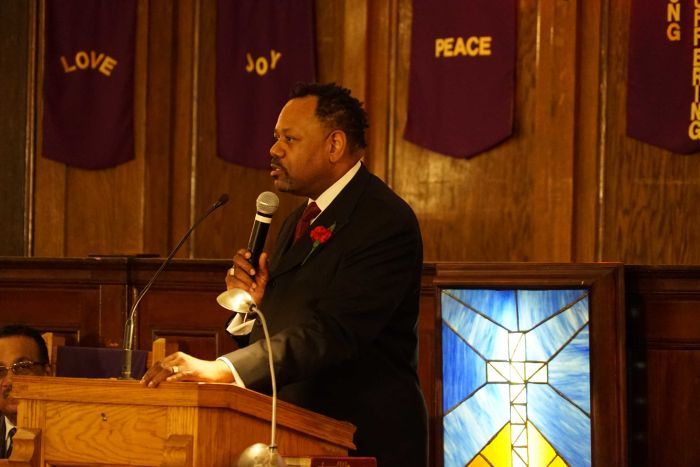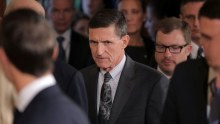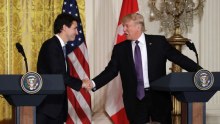Barack Obama's legacy lies somewhere between hope and despair in Chicago
Updated
 Photo:
A black and white photo of Mr Obama is taped up inside the tobacco cabinet of Altgeld Gardens general store. (ABC News: Stephanie March)
Photo:
A black and white photo of Mr Obama is taped up inside the tobacco cabinet of Altgeld Gardens general store. (ABC News: Stephanie March)
Altgeld Gardens' only general store is a dank place — paint is falling off the roof and the only items available are junk foods, alcohol and cigarettes.
Nevertheless, it is one of the most lively places in the complex on this bitterly cold Chicago day — people hustle in and out under the weight of their winter coats.
This store is one of few places in Altgeld to show any sign that this is where, decades ago, Mr Obama began his career in public service as a grassroots community organiser.
A black and white photo of America's first African American President is taped up inside the shop's tobacco cabinet.
"I think he is a great man. He did a lot of great things that we will no longer see again — like Obamacare, like all the things we should have been given decades ago," a customer who goes by the name of Duke God told the ABC.
"We won't see that any more with those Republicans in there."
 Photo:
Altgeld Gardens general store customer Duke God thinks Mr Obama is a "great man". (ABC News: Stephanie March)
Photo:
Altgeld Gardens general store customer Duke God thinks Mr Obama is a "great man". (ABC News: Stephanie March)
High crime, poverty rates still plague inner cities
Others are not so complimentary.
"He could have made it a better place, got rid of the bad people and put some good people up here," Memphis says, as he sells counterfeit DVDs to fellow customers.
 Photo:
Approximately 200 units in Altgeld Gardens are slated for demolition but some in the community are petitioning to save them. (ABC News: Stephanie March)
Photo:
Approximately 200 units in Altgeld Gardens are slated for demolition but some in the community are petitioning to save them. (ABC News: Stephanie March)
He is talking about the high crime and high poverty rates that still plague many inner-city, often predominantly African American communities across the United States.
Poem on Altgeld Gardens wall
What bullet killed him?Nobody knows
Where was he born?
In Altgeld they say?
Why did they pick him up?
He was lying in the street dead
His sweetheart comes and kisses him
His mother comes and cries
When the man came he said bury him
There goes another black brother
"All of a sudden a lot of guns are coming into Chicago that never before. And it came into my neighbourhoods, it came into poor black, brown communities," Altgeld community organiser Cheryl Johnson said.
Her late mother, Hazel, used to work with Mr Obama.
She does not blame him for the problems still plaguing communities like Altgeld — she blames the community for not being more involved.
 Photo:
Altgeld community organiser Cheryl Johnson says a lot more guns are coming into Chicago. (ABC News: Stephanie March)
Photo:
Altgeld community organiser Cheryl Johnson says a lot more guns are coming into Chicago. (ABC News: Stephanie March)
"It's the local stuff that is happening. It is our failure as people not to be politically engaged in the local decisions that are happening in our communities," she said.
Southside activist, 21-year old Jaymal Green is also frustrated by the gun violence, closed schools and lack of opportunities in African American communities.
 Photo:
Jaymal Green had hoped Mr Obama would have done more to make their lives better. (ABC News: Stephanie March)
Photo:
Jaymal Green had hoped Mr Obama would have done more to make their lives better. (ABC News: Stephanie March)
He had hoped Mr Obama would have done more to make their lives better.
"I don't care about him being black. If you are in a position of power to change people's lives in these communities and you don't, I'm going to hold you accountable for it," Mr Green said.
The symbolism of America's first African American President
 Photo:
Mr Obama delivered his farewell address in Chicago, telling the crowd to "show up, dive in, stay at it". (Reuters: John Gress)
Photo:
Mr Obama delivered his farewell address in Chicago, telling the crowd to "show up, dive in, stay at it". (Reuters: John Gress)
In Mr Obama's final major public address, he called on Americans to become more involved if they truly want to effect change.
"Show up, dive in, stay at it," he told the crowd in Chicago earlier this week.
Parts of his policy legacy are under direct threat of being abolished by the incoming Trump administration.
The President-elect has promised to repeal a raft of initiatives implemented during Mr Obama's term, including his signature healthcare policy.
The Affordable Care Act, otherwise known as Obamacare, has allowed 20 million Americans to get health care since it was enacted.
One person who does not want to see it go is Southside pastor LaRue Kidd.
 Photo:
Southside pastor LaRue Kidd says the Affordable Care Act has granted him access to health care insurance. (ABC News: Stephanie March)
Photo:
Southside pastor LaRue Kidd says the Affordable Care Act has granted him access to health care insurance. (ABC News: Stephanie March)
For years he went without healthcare because a pre-existing condition — he had two pulmonary embolisms in the past — made insurance unaffordable.
Obamacare changed that.
What is Obamacare?
- Affordable Care Act was passed by Congress in 2010
- Promised to help tens of millions of uninsured Americans get health coverage
- Under the plan, people can buy cheap insurance on healthcare.gov
- Most coverage will cost less than $US100 per month
- Policies vary according to person's income, location, family size and level of coverage desired
- More than 10 million people now have medical cover under the laws
- Number of uninsured adults reduced by 26 per cent
"I am now insured, I can go to the doctor on a regular basis, I am able to go to the pharmacy and fill my prescriptions and that is because of the Affordable Care Act," he said.
"There are so many Americans faced with whether they pay for health care, or essentials like mortgages and utilities, so it is impossible to take that away from Americans now."
Even if aspects of his policies do not last, the symbolism of America's first African American President will forever remain for some in Altgeld Garden.
"He gave us hope. He gave young folks that live in Altgeld a vision that I could be the President of the United States," Ms Johnson said.
"Hell, he got me thinking about running for local office — because that is the only way you are going to effect change."
 Photo:
This wall in Altgeld Gardens bears the names of residents who have died. (ABC News: Stephanie March)
Photo:
This wall in Altgeld Gardens bears the names of residents who have died. (ABC News: Stephanie March)
Topics: obama-barack, world-politics, government-and-politics, us-elections, united-states
First posted







